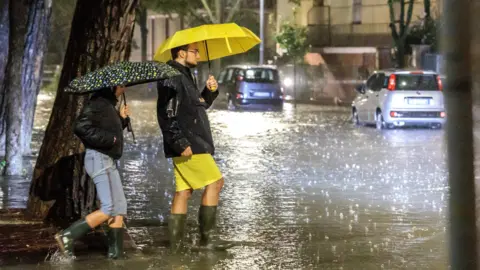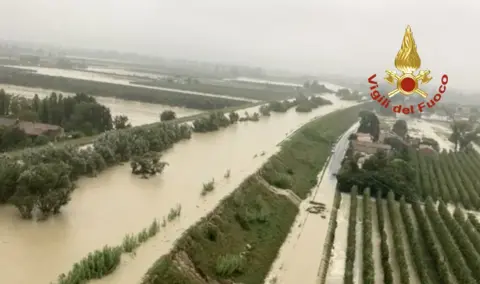 Environmental Protection Agency
Environmental Protection AgencyStorm Boris is slamming into northeastern and central Italy, days after causing widespread flooding across central Europe.
More than 1,000 people were evacuated in the northeastern region of Emilia-Romagna, while cities in central Italy’s Marche region reported severe flooding and disruption. Two people were reported missing.
On Thursday, European Commission President Ursula von der Leyen announced €10 billion (£8.4 billion) in EU funding for affected countries.
Von der Leyen made the announcement after meeting with the leaders of Poland, the Czech Republic, Slovakia and Austria to discuss aid to flood-stricken areas.
The meeting was held in the Polish city of Wroclaw, in southwestern Poland, which has been under threat from rising river levels for several days.
“Special times require extraordinary measures,” von der Leyen said at a later press conference.
Her comments come as Italy becomes the latest country to be hit by low-pressure storm Storm Boris. Sweeping through Poland, Czech Republic, Romania and AustriaAt least 23 people were killed.
Schools across Emilia-Romagna were closed, some roads were damaged by landslides and rail traffic was severely disrupted.
Authorities warned residents to stay away from basements and to move to upper floors of their homes.
Schools, libraries and parks in Ravenna were closed, and the University of Bologna canceled exams and classes.
The city of Faenza was among the hardest hit, with water levels in the two rivers that run through it rising sharply overnight.
Local media reported that residents were forced to flee their homes in the middle of the night on dinghies, as high river levels caused sewer systems to overflow.
 fire brigade
fire brigadeBut authorities in nearby Bologna said on Thursday morning that river levels in the city were under control, although weather warnings will remain in place until Friday for much of the region. A red alert for flooding and landslides has been issued in eastern Emilia-Romagna.
In Falconara on the Adriatic coast, 204 millimetres (8 inches) of rain has fallen since Wednesday, well above the September average of about 67 millimetres. In the Apennines, more than 300 millimetres (12.8 inches) of rain has been recorded.
Rain is expected to taper off on Friday and the weekend is expected to be mostly dry, but the risk of flooding could persist as seen elsewhere in central Europe.
For the people of Emilia-Romagna, Storm Boris means: Just a year ago, the area suffered severe and deadly floods..
In May 2023, six months’ worth of rain fell in a day and a half, killing 13 people and causing more than 20 rivers to overflow.
Tens of thousands of people were forced to flee their homes and the floods caused billions of euros in damage.
The worst of Storm Boris appears to have passed for most of the region, but Danube waters are still rising in Hungary. Prime Minister Viktor Orban said on Wednesday that water levels in Budapest were expected to peak Saturday afternoon or evening, but would still be below the record highs recorded in 2013.
Recent events in Central Europe fit with expectations that global warming will lead to an increase in extreme precipitation, but it is not yet possible to quantify how much of a role climate change has played.
But climate scientists have been warning for years that such extreme precipitation events could occur more frequently due to global warming.

